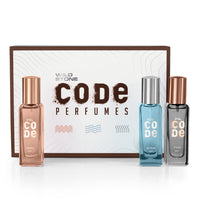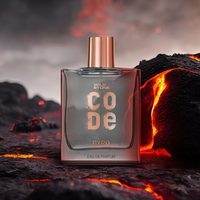Ever wondered about the mysterious origins of perfumes? Today, we are delving into the interesting story of perfumes. The Wild Stone CODE Team will take you on a journey through time and culture that has shaped the perfumes for men we wear today.
Buckle up!
The Ancient Origins
Perfume is as old as civilisation itself. Picture the banks of the Nile in ancient Egypt, around 3000 BC. Pharaohs, the rulers of ancient Egypt, aspired to be cloaked in divine scents as they embarked on their voyage to the afterlife. The Egyptians even had a god, Nefertem, dedicated to the art of perfume. They concocted perfumes from aromatic woods, fruits, flowers, resits and exotic oils.
Fast forward to ancient Greece, fragrance became essential to their grooming rituals. The Greeks believed in the power of aroma to enhance their social standing and as an offering to the gods.
The Middle Ages: The Perfume Trades
The Middle Ages were a time of intrigue and adventure in perfumes. Thanks to trade routes, rare spices, herbs, and scented woods like agarwood travelled across continents.
The Byzantines, Persians, and Arabs became maestros in the art of perfumery, and they traded these precious concoctions with Europe.
During this period, perfume was not just for having a significant presence. It was believed to ward off diseases and evil spirits. The knights would carry perfumed handkerchiefs into battle – talk about fragrant warfare!
The Renaissance and Royal Elegance
When the Renaissance spread throughout Europe, perfume symbolised wealth and sophistication, not just for health or spirituality. The continent was in the grip of the "Age of Discovery," and explorers were bringing back new scents from exotic lands. Perfume innovation thrived at the heart of the French royal court, where Queen Catherine de Medici and King Louis XIV championed their production and pushed the boundaries of creativity.
India's Rich History
Perfume-making in ancient India, dating back to the Indus Valley Civilization, used natural ingredients like flowers, herbs, and spices. Ayurveda, over 5,000 years old, emphasises fragrances for therapeutic and cosmetic purposes, using ingredients like sandalwood, jasmine, rose, and saffron.
Indian religious rituals incorporated perfumes, and the Mughal Empire's luxury-loving rulers furthered perfumery. India is renowned for traditional attar perfumes from steam-distilled or cold-pressed flowers, herbs, and spices, such as rose, jasmine, and sandalwood. These attars have been produced for centuries in places like Kannauj, Uttar Pradesh.
The Industrial Revolution: Mass Production
The 19th century saw the dawn of modern perfumery with the invention of synthetic fragrances. Suddenly, perfumes were no longer the privilege of the elite; they became accessible to the masses. Celebrity endorsements and mass media made perfume a fashion statement.
Today, we live in a world where perfumes for men are a multi-billion-dollar industry. Perfumers constantly push the boundaries of creativity to create perfumes that evoke emotions and memories.
Perfume's history is a testament to its enduring appeal and ability to evoke emotions and memories, making it a part of our lives. As you immerse yourself in your favourite perfume, remember that it's a fragrant thread connecting us to a past as ancient and diverse as humanity.
Related Articles
A Journey through Elements of Nature
Start Your Perfume Journey: A Beginner’s Guide to Fragrances
The Art of Perfume: 5 Ways to Spray It Right
The Role of Luxury Perfumes in Festivities
The Ultimate Guide to Men's Perfumes: Day, Night, and Special Occasions








